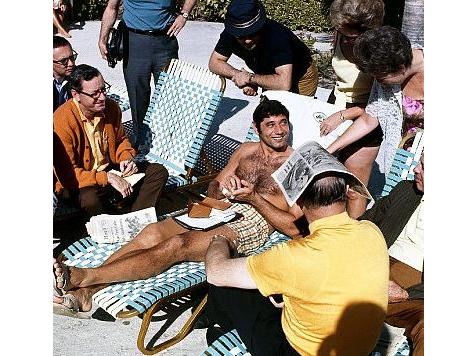
The Miami Herald’s Greg Cote made an observation on Saturday that is likely to cross the minds of many fans shivering in the cold at Sunday’s Super Bowl in New Jersey’s MetLife Stadium:
[W]e’ll be down here in our T-shirts, shorts and flip-flops braving our 70-degree winter on Sunday while the NFL distributes hand-warmers and ear muffs to freezing fans arriving for its brutally arctic outdoor Super Bowl in East Rutherford, N.J.
Cote, like many residents of South Florida, thinks of Miami as “the Super Bowl City,” and for good reason. Miami has hosted ten of the previous forty-seven Super Bowls. Five were held in the old Orange Bowl (1968, 1969, 1971, 1976, 1979) and another five were held in what was once called Joe Robbie Stadium but is now known as Sun Life Stadium (1989, 1995, 1999, 2007, 2010). Only New Orleans has hosted as many Super Bowls as Miami, with ten. Even sunny Los Angeles has hosted a mere seven Super Bowls.
As Cote points out:
…[s]o much of the best of Super Bowl history has our stamp… Joe Namath’s famous ‘guarantee’ was made seated poolside in Miami. The only Perfect Season ever was by Miami. Terry Bradshaw refashioned his reputation in the Orange Bowl. Joe Montana made a career-defining drive at Joe Robbie Stadium. John Elway retired on top of the world here. Peyton Manning won his only (so far) Super Bowl here.
But Miami, which last hosted a Super Bowl in 2010, is not scheduled to host the 2015, 2016, or 2017 Super Bowls, and is not on the list of finalists to host the 2018 Super Bowl.
Warm weather Glendale, Arizona’s University of Phoenix Stadium has been awarded the 2015 Super Bowl. The 2016 Super Bowl will be played in the San Francsico 49er’s new Levi Stadium in balmy Santa Clara, California. In 2017, the Super Bowl returns to the sub-tropical climes of the Houston Texan’s Reliant Stadium.
Miami did not make the cut for the 2018 Super Bowl. The three finalist cities are warm weather New Orleans and cold weather Indianapolis and Minneapolis.
As Cote notes, Miami “won’t be in the running to host another one until at least 2019. See, we have relied on the salesmanship of our weather and being a cosmopolitan, wonderfully diverse destination resort, a city so many folks from elsewhere save all year to visit on vacation.”
Cote has a bottom line explanation why Miami is no longer hosting Super Bowls. “[T]he NFL wants all that AND stadium upgrades, the getting of which have proved problematic.”
Reading the tea leaves inside NFL politics, it seems that cold weather New York-New Jersey has a better chance of hosting its second Super Bowl before Miami hosts its eleventh.
John Mara, co-owner of the New York Giants, is already making that case. He told ESPN on Sunday he wants more Super Bowls in the New York-New Jersey area.
The NFL wants the Super Bowl to be played in a state-of-the-art stadium. Sun Life Stadium, which is owned by Stephen Ross, owner of the Miami Dolphins, is not state-of-the-art enough for the NFL. Efforts to finance upgrades to the home of the Dolphins with public funds have fallen flat in recent years.
As Fox Sports reported in 2010:
South Florida hosted its record 10th Super Bowl in February, but the NFL is threatening not to return unless significant renovations are made. That bluff may have to get called. Sensing an unsympathetic populace, the Dolphins already pulled the plug on pitching a $200-million hotel tax proposal that would have included a partial stadium roof.
As long as the NFL requires host cities to provide state-of-the-art venues, it seems unlikely that Miami will host another Super Bowl for many years to come.
Image Source: Sports Illustrated

COMMENTS
Please let us know if you're having issues with commenting.